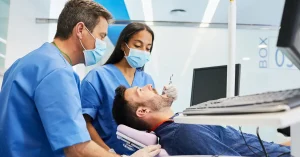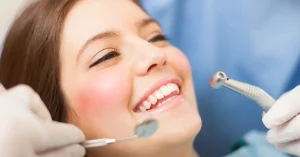Introduction
Imagine this: it’s evening, you wake with a throbbing toothache or you bite into something and suddenly a piece of your tooth chips off. You might ask: Is this an emergency that needs to be seen tonight, or can it wait until morning?
The truth is: knowing the difference between urgent and non-urgent dental emergencies can save you pain, cost, stress — and even save a tooth. At Roots Dental in Bellingham, we understand how confusing this can be. That’s why this guide is here: to help you understand when you should call us right away, when you can schedule soon, and what steps you can take in the meantime.
What Counts as a Dental Emergency?


A “dental emergency” is any dental issue that requires prompt action, because it may lead to more serious problems if ignored. According to trusted sources like the American Dental Association (ADA) and the Cleveland Clinic, emergencies include things like uncontrolled bleeding, infection, severe pain, or trauma to the teeth or mouth.
That said, not all dental issues are true emergencies. Some can wait a short while without immediate damage. The trick is knowing which category you’re in — that’s what we’ll break down next.
Understanding the Two Categories of Dental Emergencies
1. Urgent Dental Emergencies
These are the conditions that should be seen as soon as possible — ideally same-day or within hours. They often carry risk of irreversible damage, greater pain, or infection spreading.
Common urgent situations include:
- A tooth that’s been knocked out (avulsed) — the sooner it’s reinserted (ideally within 30-60 minutes), the better the chance of saving it.
- A cracked or broken tooth that causes pain or exposes the inner nerve.
- A severe toothache or abscess with swelling, fever or pus — indicating infection.
- Bleeding from the mouth that will not stop after applying pressure.
- Facial swelling, especially around the jaw or eye, or any trauma that affects ability to breathe or swallow.
Why act quickly? Because untreated urgent issues can escalate into much more serious problems — including jaw infections, airway issues, or even hospitalisation. For example, one study described dental emergencies that are “potentially life-threatening diagnoses requiring immediate treatment to stop bleeding, remedy the infection, and alleviate severe pain.”
Another recent U.S. study noted that communities with greater dental‐provider access had significantly fewer emergency dental visits for non-traumatic conditions — underscoring how prompt dental care prevents escalation.
What to do right away if you have an urgent problem:
- Rinse your mouth with clean warm water.
- If a tooth is knocked out: pick it up by the crown (not the root), gently rinse it (don’t scrub), and either reinsert it (if possible) or place it in milk or saliva.
- Apply a cold compress outside the cheek for swelling.
- Avoid chewing on the damaged side.
- Call your dentist immediately (at Roots Dental, call us for same-day emergency care in the Bellingham area).
2. Non-Urgent Dental “Emergencies”
These are issues that still need attention but don’t usually require immediate, same-day intervention. They might be uncomfortable, and if left un-seen may turn into more serious problems — but they aren’t typically dangerous right away.
Examples include:
- A mild toothache or sensitivity that comes and goes, with no swelling or fever.
- A small chip in a tooth that doesn’t hurt (but should be monitored).
- A lost filling or crown, where the tooth is exposed but not actively infecting or painful.
- A broken retainer or denture that is irritating but not causing swelling or infection.
While these can usually wait for a next-day visit, it’s still wise to call your dentist soon — maybe schedule an appointment for the next day or two. Waiting too long may let a small problem become a big one.
According to a recent article, non-urgent issues can often be managed with routine care and monitoring, but “waiting too long to seek treatment can further damage your teeth or gums and may even lead to complications.”
When to Visit the Dentist vs. the Hospital Emergency Room


Most dental emergencies — urgent or non-urgent — are best treated by your dentist or an emergency dental clinic. Why? Because dentists are trained and equipped to treat teeth, gums, infections, and trauma in an office environment. Hospitals or ERs often treat the symptoms (like pain or bleeding) but may not fix the underlying dental issue, and typically cost much more.
However — there are clear signals when you should go to the ER instead of waiting for a dental office:
- The injury involves major facial trauma (broken jawbone, severe lacerations, shattered teeth and bones).
- You have an infection that is spreading rapidly, with swelling into the neck or under the jaw, difficulty breathing or swallowing.
- Uncontrolled bleeding after dental trauma or surgery that you cannot stop.
In these cases, you may need medical care immediately, then follow-up with your dentist. Otherwise, call your dentist first and ask for guidance.
How to Handle a Dental Emergency Before You Get to the Dentist
Even while you are waiting for care, you can take smart steps to reduce risk and pain. Here are practical tips:
- Knocked-out tooth: Keep it moist (milk or saliva is best), don’t let it dry out.
- Broken tooth/fracture: Rinse your mouth, don’t chew on that side, hold a cold compress to your face to reduce swelling.
- Severe pain or swelling: Use over-the-counter pain relief (following the instructions), rinse with salt-water (1/2 tsp salt in warm water) to clean the area.
- Bleeding: Apply firm pressure with clean gauze or cloth for 10-15 minutes; if it doesn’t stop, seek immediate help.
- Lost filling or crown: Don’t chew on that side; avoid very hot/cold foods; keep the area clean; call your dentist to schedule soon.
These steps won’t replace professional care — but they help you stabilise the situation and reduce complications while arranging treatment.
Prevention: How to Avoid Dental Emergencies
As your dentist, I believe that preventing problems is just as important as treating them. Here are some ways to reduce your risk of both urgent and non-urgent dental emergencies:
- Attend regular check-ups and cleanings (every 6 months, or as recommended).
- Wear a mouthguard for sports or high-risk activities.
- Avoid using your teeth as tools (e.g., opening bottles, tearing packaging).
- Address small issues early — a tiny chip, a loose crown, or minor sensitivity can turn into major work if ignored.
- Maintain good daily habits: brushing twice, flossing daily, limiting sugary snacks and drinks, staying hydrated.
Preventive care not only saves your smile — it also saves you time, stress, and cost.
When to Call Roots Dental
At Roots Dental in Bellingham, we understand that emergencies don’t keep office hours. That’s why our team is ready to help you assess your situation and provide same-day care for true dental emergencies. Whether you’re unsure if your issue is urgent or not, give us a call — we’ll help you decide the best next step.
We believe in compassionate, judgment-free care — no one should feel embarrassed about asking “Is this serious?” or “Can I wait?” Our goal is to restore your comfort, protect your oral health, and get you back to smiling confidently.
If you’re experiencing pain, swelling, or dental trauma, don’t wait. Call Roots Dental today and let us guide you on what comes next.
FAQ: Common Questions About Dental Emergencies
1. How do I know if my toothache is an emergency?
If the pain is very intense, lasts more than a day, comes with swelling or fever, or doesn’t improve with over‐the‐counter pain relief — treat it as urgent and call immediately.
2. What should I do if I lose a filling or crown?
That is usually non-urgent but still important. Avoid chewing on that side, keep the area clean, and call your dentist for an appointment soon — ideally within a day or two.
3. Can I go to the emergency room for dental pain?
You can, but unless the issue involves major trauma, airway threat, or uncontrolled bleeding, your dentist is usually the better option. ERs may relieve pain but often can’t fix the underlying dental problem.
4. My child knocked out a baby tooth — is that urgent?
In general, lost baby teeth are less urgent than permanent teeth. But if there’s pain, bleeding, or the permanent tooth is damaged, call your dentist right away for guidance.
5. Does Roots Dental accept walk‐ins for emergencies?
Yes — we prioritise same-day or next‐available appointments for urgent situations in Bellingham. Give us a call and we’ll fit you in.
Conclusion


Dental emergencies can be stressful — but knowing the difference between urgent and non-urgent gives you a roadmap to act wisely.
- Urgent = immediate risk, needs same-day attention to protect your tooth, gums or health.
- Non-urgent = important, but typically safe to schedule soon rather than tonight.
Either way — don’t ignore it. Pain, trauma, and infections don’t get better on their own.
If you’re in the Bellingham area and wondering whether you should act now or wait — call Roots Dental. We’re here to help you decide, provide timely care, and protect your oral health. Your smile deserves it.

